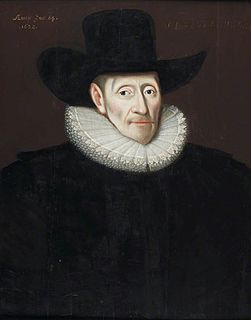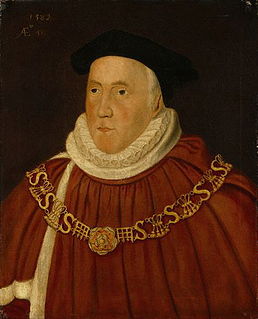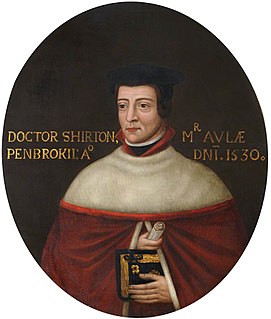Related Research Articles

Tenby is both a walled, seaside town in Pembrokeshire, Wales, on the western side of Carmarthen Bay, and a local government community.

Sir Eubule Thelwall was a Welsh lawyer, academic and politician who sat in the House of Commons between 1624 and 1629. He was principal of Jesus College, Oxford from 1621 to 1630.

New Inn Hall was one of the earliest medieval halls of the University of Oxford. It was located in New Inn Hall Street, Oxford.

John Wynne was Bishop of St Asaph (1715–1727) and of Bath and Wells (1727–1743), having previously been principal of Jesus College, Oxford (1712–1720).
David Lewis was a Welsh lawyer, judge, and the first Principal of Jesus College, Oxford.

Sir Christopher Wray was an English judge and Chief Justice of the King's Bench.
Francis Bevans was a Welsh lawyer who was Principal of Jesus College, Oxford, from 1586 to 1602.
This article is about the particular significance of the century 1501–1600 to Wales and its people.

William Aubrey was Regius Professor of Civil Law at the University of Oxford from 1553 to 1559, and was one of the founding Fellows of Jesus College, Oxford. He was also a Member of Parliament for various Welsh and English constituencies between 1554 and 1592.
John Cotterell DCL was an English clergyman and academic at the University of Oxford, who was one of the founding fellows of Jesus College, Oxford.
Henry Rowlands (1551–1616) was a Welsh bishop of Bangor.

Robert Shorton was an English churchman and academic, first Master of St John's College, Cambridge and Archdeacon of Bath.
Thomas Nuce or Newce was an English translator from Latin.
John Griffith was a Welsh politician who sat in the House of Commons from 1571 to 1609.
John Lougher was a Welsh politician who sat in the House of Commons in 1601.
Richard Amhurst was an English lawyer and politician who sat in the House of Commons between 1614 and 1622.

Oliver Whiddon was Archdeacon of Totnes between 1568 and 1580.
Humphrey Tyndall was an English churchman who became the President of Queens' College, Cambridge, Archdeacon of Stafford, Chancellor of Lichfield Cathedral and Dean of Ely.
Francis Newton was an English clergyman who served as Dean of the Winchester Cathedral from 1565 until his death in 1572.
References
- 1 2 W R Williams Parliamentary History of the Principality of Wales
- ↑ Alumni Oxonienses 1500-1714, Lloyd-Lytton
- 1 2 3 Ingram, Martin (January 2008). "Lougher, Robert (d. 1585)". Oxford Dictionary of National Biography (online edition, subscription access). Oxford University Press . Retrieved 20 February 2008.
- ↑ "The Founders". jesus.ox.ac.uk. Retrieved 12 October 2018.
- 1 2 Aston, T.H. (ed.), The History of the University of Oxford, Volume III: The Collegiate University, pp. 264-265